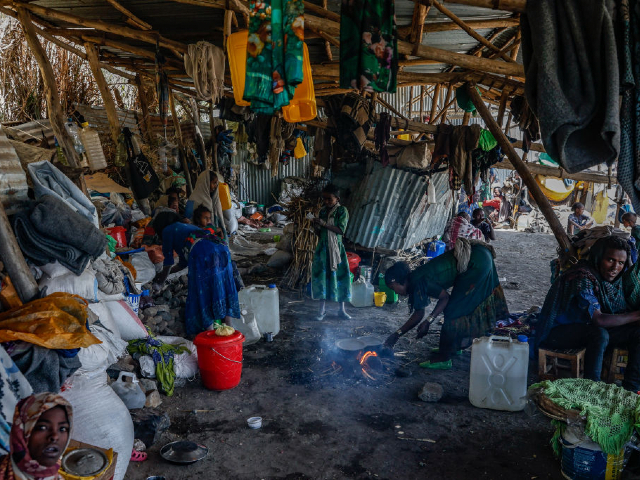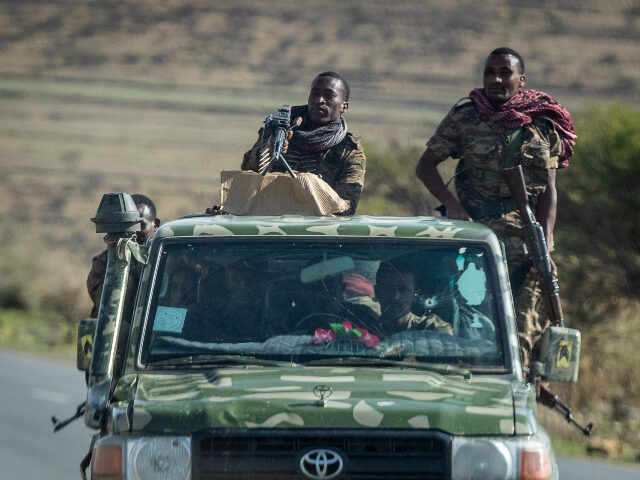A spokesman for the Tigray People’s Liberation Front (TPLF) – the Marxist political party and armed militia that has been fighting an insurgency against the Ethiopian central government since November 2020 – claimed on Tuesday that neighboring Eritrea launched a “full-scale offensive” across the Ethiopian border into the Tigray region.
The Tigrayan claim, which outside sources could not immediately verify, came a day after the Canadian government warned travelers that Eritrea “issued a general call for mobilization of armed forces in response to the conflict in northern Ethiopia.”
African diplomats in Eritrea reported on Monday that their embassy guards feared being drawn into a “widespread conscription” and sent to fight in Ethiopia. The TPLF claimed it had intelligence indicating Eritrea was activating “sixty-year-old reservists” and preparing to march them across the border.
On Tuesday, TPLF spokesman Getachew Reda – the same representative who warned about elderly Eritrean veterans preparing for active duty – said a massive attack against Tigray was underway and Eritrea’s reserves had already been called in.
“Eritrea is deploying its entire army as well as reservists. Our forces are heroically defending their positions,” he claimed.
Getachew also said “special forces” from the rival Amhara tribe and Ethiopian government troops were joining in the attack. The federal government and Ahmara representatives declined media comment on the report.
Ethiopia and Eritrea fought over contested territory for 20 years until the current president of Ethiopia, Abiy Ahmed, negotiated an end to the conflict. Abiy was awarded the Nobel Peace Prize in 2019 for this achievement, an award his critics would like to see recalled because of the devastating war–and accused genocide–he launched against Tigray the following year, with the Eritreans now his military allies.
Abiy’s government denied cross-border operations from Eritrea until March of 2021 when Abiy admitted the foreign troops were involved and Eritrea agreed to withdraw them. The TPLF claims Eritrean forces have been exceptionally brutal towards both Tigrayans and Eritrean refugees who are camped in Ethiopia.
The TPLF and Abiy’s government agreed to an uneasy ceasefire in March 2022 that lasted until August, when the TPLF said Abiy was readying a “massive four-pronged offensive” against Tigray with the assistance of Eritrean forces. The federal military began conducting airstrikes against the Tigrayan capital city of Mekelle, with significant civilian casualties.

SEKOTA, ETHIOPIA – MARCH 30: Internally displaced people from the Wag Hemra zone prepare meals within one of the shelters at the Meberat Haile IDP camp on March 30, 2022 in Sekota, Ethiopia. The residents of the Wag Hemra zone are currently unable to return to their homes due to the continued occupation by forces of the Tigray Peoples Liberation Front (TPLF). State authorities in Amhara recently said that 11.6 million people in the region are in need of food aid, including hundreds of thousands displaced by the conflict between the Ethiopian government and Tigrayan forces. (Photo by J. Countess/Getty Images)
The U.N. Human Rights Commission on Monday accused the Abiy government and its allies of abuses against Tigray that “amount to war crimes and crimes against humanity,” including a year of blockade and deprivation that left 90 percent of Tigray’s six million people in severe need of assistance.
U.N. investigators said they saw “reasonable grounds to believe that the Federal Government and allied regional State governments have committed and continue to commit the crimes against humanity of persecution on ethnic grounds and other inhumane acts.”
“The widespread denial and obstruction of access to basic services, food, healthcare, and humanitarian assistance is having a devastating impact on the civilian population, and we have reasonable grounds to believe it amounts to a crime against humanity,” said commission chair Kaari Betty Murungi.
Murungi described the situation in Tigray as “shocking” and said there was evidence the federal government was deliberately using starvation as a weapon against the Tigrayans. She also admonished Tigrayan forces not to interfere with humanitarian relief operations.
“With a resumption of hostilities in northern Ethiopia, there is a very real risk of further civilian suffering and further atrocity crimes,” she warned.

COMMENTS
Please let us know if you're having issues with commenting.